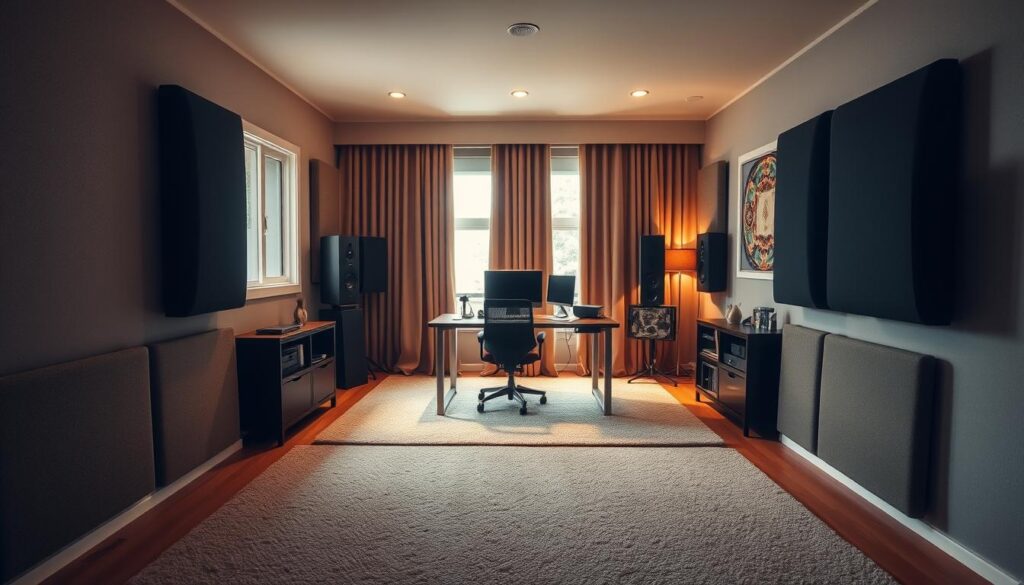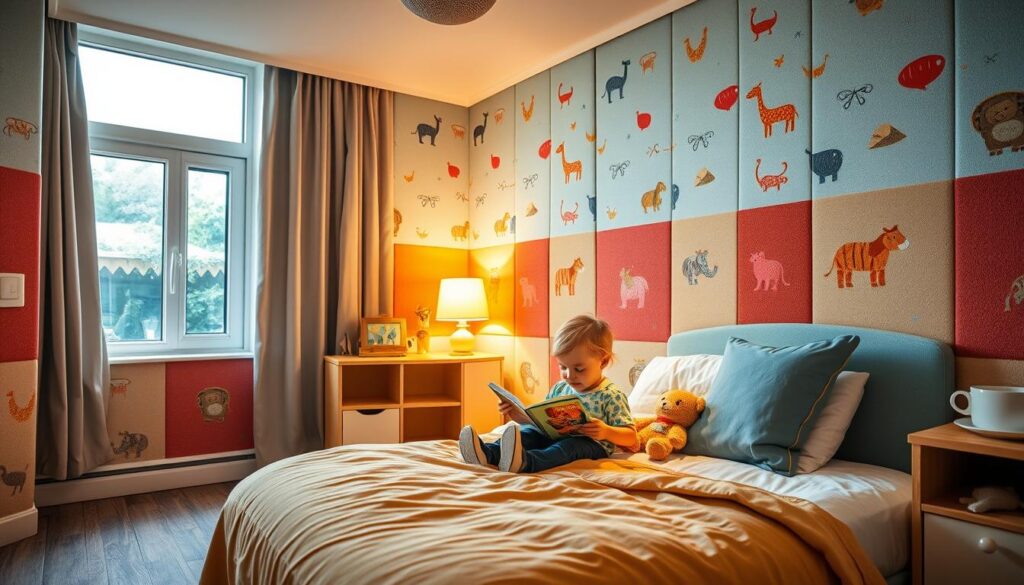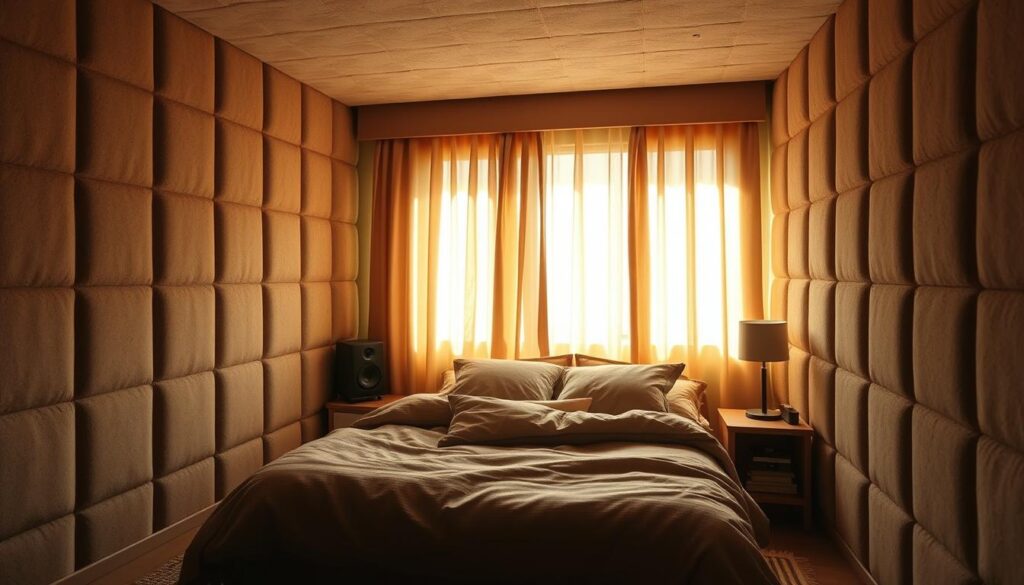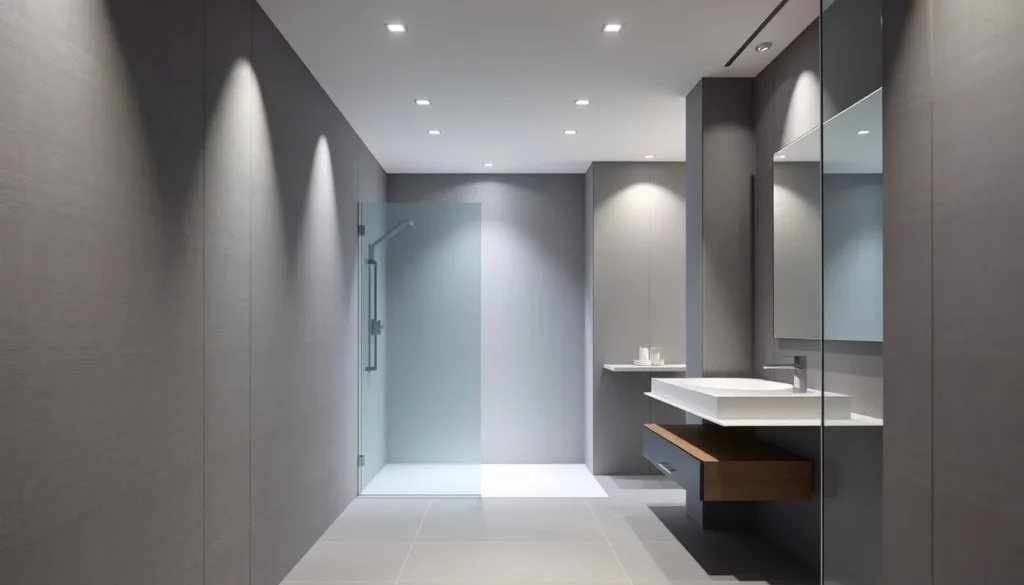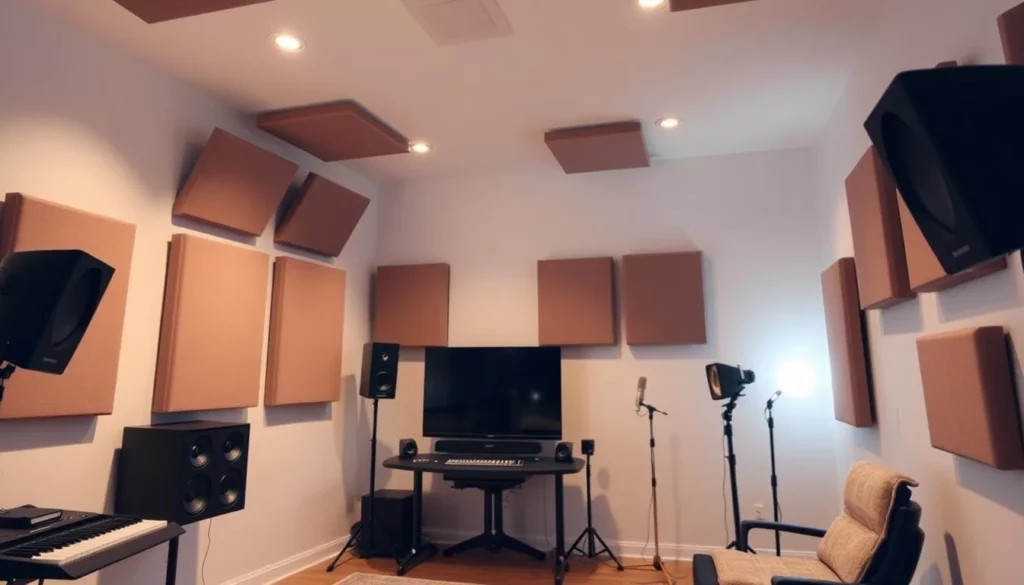Working from home can be challenging, and noise is a big problem. It can come from family, neighbors, or outside traffic. To stay focused, you need a quiet space.
To make your work area better, you need good soundproofing solutions. The right materials and methods can lower noise. This makes your work space better.
For more tips on soundproofing your home office, check out soundproofing work-from-home solutions. It will help you make a quieter, more focused place to work.
Understanding the Importance of Soundproofing Your Home Office
Soundproofing your home office is more than just blocking out noise. It’s about making a space that helps you work better and feel less stressed. A good soundproofing setup can make your work area better, helping you focus and reach your goals.
Soundproofing is key for staying productive. A quiet space lets you focus on your work without distractions. This means you can do your job better and meet deadlines.
Why Soundproofing is Essential for Productivity
Soundproofing is vital for a productive home office. It keeps out external noise, helping you concentrate and do your job well. Here are some main benefits:
- Enhanced focus due to reduced noise distractions
- Improved work quality and efficiency
- Better time management and meeting deadlines
Also, a soundproofed office helps keep your work and personal life separate. This is crucial in a home office where work and personal life can mix too much.
Common Distractions in Home Offices
Home offices face many distractions that can slow you down. Some common ones are:
| Distraction | Impact on Productivity | Soundproofing Solution |
|---|---|---|
| Family Members/Roommates | Interruptions and noise | Acoustic panels or door seals |
| Pets | Barking or meowing noises | Sound-absorbing materials or pet-friendly areas |
| Outside Noise | Traffic, construction, or neighbors | Soundproof windows or wall insulation |
Knowing these distractions helps you find the right soundproofing solutions. For example, acoustic panels can cut down echo and reverberation. Door seals stop noise from getting in or out.
Using cost-effective soundproofing solutions can greatly improve your home office. It reduces distractions and helps you focus better. This boosts your productivity and work quality. Whether it’s family noise, pets, or outside sounds, there’s a solution to make your work space better.
Assessing Your Current Sound Environment
Knowing the sounds around you is key to a quiet home office. To soundproof well, first spot the noise sources and their effect on work.
Identifying Noise Sources in Your Space
Noises can come from inside or outside. Inside, it’s family, pets, or appliances. Outside, it’s traffic, neighbors, or building work. Spotting these sources is key for better soundproofing.
Make a list of the noises in your office. Are they always there or now and then? Are they loud or quiet? Knowing this helps pick the best soundproofing materials and methods.
Tools for Measuring Sound Levels
To really know your office’s noise, you need a sound level meter. It shows decibel levels, helping you see the noise problem clearly.
There are many sound level meters, from phone apps to advanced devices. With one, you can see how bad the noise is. Then, pick the right DIY soundproofing or materials for your office.
| Noise Source | Typical Decibel Level | Soundproofing Solution |
|---|---|---|
| Traffic | 80-90 dB | Soundproof windows, acoustic panels |
| Family Members | 60-80 dB | Acoustic panels, door seals |
| Pets | 50-70 dB | Rugs, carpets, sound-absorbing materials |
By knowing your sound environment and using the right tools and materials, you can cut down noise. This makes your home office more productive.
Cost-Effective Soundproofing Techniques
You can make your home office quieter by using affordable soundproofing methods. Soundproofing isn’t just about stopping all noise. It’s about making a space where you can focus better. With the right techniques, you can cut down on distractions and work more efficiently.
Using Acoustic Panels for Wall Treatment
Acoustic panels are a smart and budget-friendly way to cut down echo and absorb sound in your home office. You can put these panels on walls or ceilings to lessen reverberation. By adding acoustic panels, you can make your space quieter and more conducive to concentration.
Adding Rugs and Carpets to Absorb Sound
Along with acoustic panels, adding rugs and carpets can also help absorb sound in your home office. Hard floors like hardwood or tile can bounce sound around, making a room feel louder. By using rugs and carpets, you can dampen echo and make your space quieter.
Here is a comparison of different soundproofing materials:
| Material | Sound Absorption | Cost |
|---|---|---|
| Acoustic Panels | High | Moderate |
| Rugs and Carpets | Moderate | Low |
| Mass-Loaded Vinyl | High | High |
By using these affordable soundproofing methods, you can make your home office more productive. Think about getting help from professional soundproofing services for home offices to find solutions that fit your needs.
Advanced Soundproofing Options
Looking for the quietest home office? Advanced soundproofing can make it happen. When basic methods don’t cut it, it’s time to get serious.
Installing soundproof windows is a top choice. These windows block outside noise, making your office quieter. They often have double or triple glazing to soak up sound waves.
Installing Soundproof Windows
Soundproof windows are great for noisy areas or offices near busy streets. Replacing your old windows with new ones is a big step. But, it’s worth it for better work quality and peace.
Upgrading Your Door for Better Noise Resistance
Don’t forget about your door. Upgrading your door can also help block sound. Look for solid-core or soundproof doors. Adding door seals or weatherstripping can also help.
When picking a new door, check its Sound Transmission Class (STC) rating. A higher rating means better sound blocking. Also, consider a door sweep or threshold seal to keep sound in or out.
With these advanced soundproofing steps, your home office can become a quiet, productive space. Whether you hire a pro or do it yourself, the right solutions can turn your office into a peaceful retreat.
Insulation Strategies for Better Sound Control
Effective insulation is key for better sound control in your home office. It not only lowers noise but also makes your workspace better. By picking the right materials and methods, you can greatly boost soundproofing.
Selecting Appropriate Insulation Materials
The material you choose for insulation is very important for soundproofing. Fiberglass and cellulose are top choices because they soak up sound well. Fiberglass cuts down on airborne noise, and cellulose packed tightly in walls stops sound from escaping.
Mass-loaded vinyl is also great for sound control. It’s heavy and dense, making it perfect for keeping sound in.
Techniques for Effective Wall and Ceiling Insulation
Insulating walls and ceilings needs careful thought. Using acoustic panels on walls helps absorb sound. For ceilings, adding insulation batts or a soundproofing blanket works well to block sound.
It’s also important to seal all gaps and cracks. Sound can easily sneak through tiny openings.
- Use insulation materials that are made for soundproofing.
- Make sure your walls and ceilings are well-insulated to stop sound from leaking.
- If you’re not sure about insulation techniques, consider getting professional help.
By using these insulation strategies, you can make your home office quieter and more productive. The secret to good soundproofing is choosing the right materials and using the right techniques.
Incorporating Soundproofing Materials
To soundproof your home office, you need the right materials. It’s not just about cutting down noise. It’s also about making a space that helps you work better. The right stuff can really help with that.
Overview of Soundproofing Materials
There are many soundproofing materials out there. Each one has its own strengths and benefits. Some top picks include:
- Acoustic panels: These soak up sound waves, cutting down on echo and reverberation.
- Mass-loaded vinyl: A flexible, heavy vinyl sheet that helps dampen sound.
- Door seals: These seal gaps between doors and frames, stopping sound from getting through.
- Soundproof curtains: Thick, heavy curtains that can cover windows and block out noise.
| Material | Purpose | Effectiveness |
|---|---|---|
| Acoustic Panels | Absorb sound waves | High |
| Mass-loaded Vinyl | Dampen sound | High |
| Door Seals | Seal gaps between doors and frames | Medium |
| Soundproof Curtains | Cover windows and reduce noise | Medium |
Where to Purchase Quality Soundproofing Products
You can find soundproofing materials online and in specialty stores. Some great places include:
- Amazon: Has a wide selection, including acoustic panels and mass-loaded vinyl.
- Home Depot: Offers various materials, like door seals and soundproof curtains.
- Specialty soundproofing stores: They have lots of materials and can give expert advice.
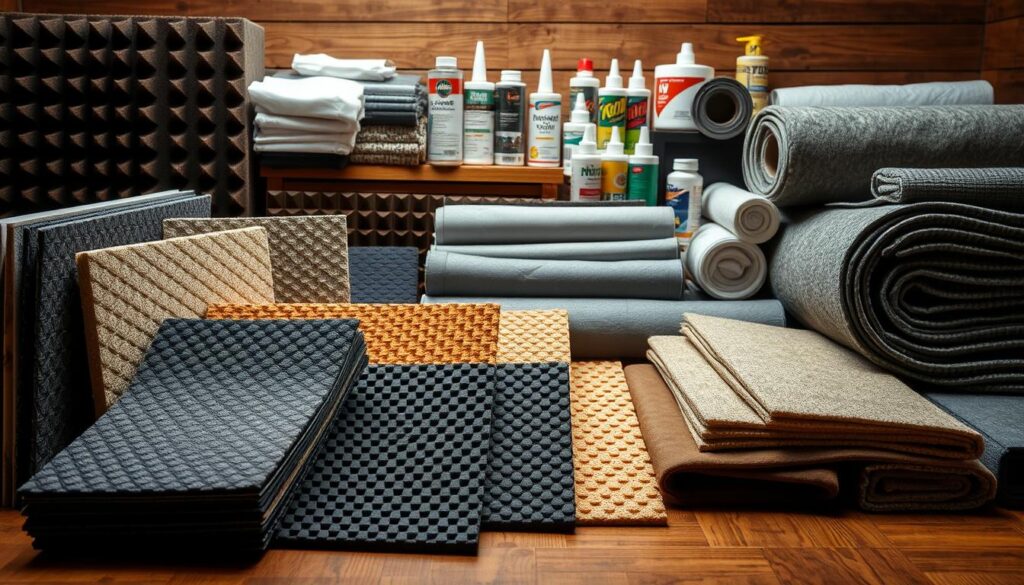
When buying soundproofing materials, think about what your home office needs. Picking the right stuff and installing it right can make your workspace quieter and more productive.
Layout Considerations for Sound Management
Managing sound in your home office begins with careful layout planning. The setup of your furniture and equipment greatly affects the noise level in your space.
Ideal Layouts for Minimal Disruption
For less noise, place your desk in a quiet spot, away from windows and doors. This spot helps block outside sounds. Also, using dividers or partitions keeps sound in one area, stopping it from echoing or spreading.
- Position your workspace away from high-traffic areas.
- Utilize corners and alcoves to create a quieter workspace.
- Consider the placement of noisy equipment, like printers, in a separate area.
Arranging Furniture for Enhanced Soundproofing
Smart furniture arrangement can also improve soundproofing. For example, bookshelves against walls can absorb sound. Heavy furniture blocks sound paths. Plants and acoustic panels can also cut down on echo and noise.
If you need more soundproofing help, think about getting professional advice. Professional soundproofing services offer tailored advice for your home office. They help you manage sound effectively.
Utilizing Technology for Soundproofing
Technology brings new ways to soundproof your home office. With the right tools, you can cut down on background noise. This makes your work space better for getting things done.
White Noise Machines for a Quieter Environment
White noise machines help make your office quieter. They produce a constant sound that covers up other noises. They’re great at hiding sounds like traffic or loud neighbors.
Getting a good white noise machine can make your work area more peaceful. This helps you stay focused and productive.
Headphones and Sound Masking Devices
Headphones and sound masking devices are also good for soundproofing. Noise-cancelling headphones block out background sounds. Sound masking devices make listening more comfortable. They’re great for phone calls or listening to music while working.
Using tech like white noise machines and headphones makes your office quieter and more productive. These solutions are affordable and can work well with other methods for the best results.
Maintenance and Upkeep of Soundproofing Solutions
To keep your home office productive, you need to take care of your soundproofing. It’s a continuous effort that means checking and improving sound quality regularly.
Regular Checks for Wear and Tear
It’s important to check your soundproofing materials often. Look for dust on acoustic panels and check door seals for damage. Make sure windows are sealed well. Spotting problems early can stop bigger issues later.
Don’t forget to test your soundproofing materials. Play music or white noise and see if it stays inside or outside your office.
| Component | Inspection Frequency | Common Issues |
|---|---|---|
| Acoustic Panels | Monthly | Dust accumulation, damage |
| Door Seals | Quarterly | Cracks, wear |
| Windows | Bi-annually | Seal failure, damage |
Enhancing Your Soundproof Setup Over Time
As your needs change, your soundproofing might need updates. Think about adding new materials or upgrading old ones. Professional soundproofing services can offer great advice and tailored solutions for your office.
Improving your soundproofing can be done in several ways. You could add more acoustic panels, use mass-loaded vinyl, or include sound-absorbing furniture in your design.
Final Thoughts on Creating a Peaceful Home Office
Making your home office peaceful is key for being productive and feeling good. Soundproofing helps cut down on distractions, making your work better. It’s a bit of work to soundproof, but it’s worth it.
Assessing the Benefits
Soundproofing makes your workspace quieter, helping you focus and work better. You can check out soundproofing options to find what works best for you.
Staying Ahead of the Curve
New soundproofing trends include advanced materials and tech. Keeping up with the latest tips helps you create a soundproofing plan that fits your needs and budget.
